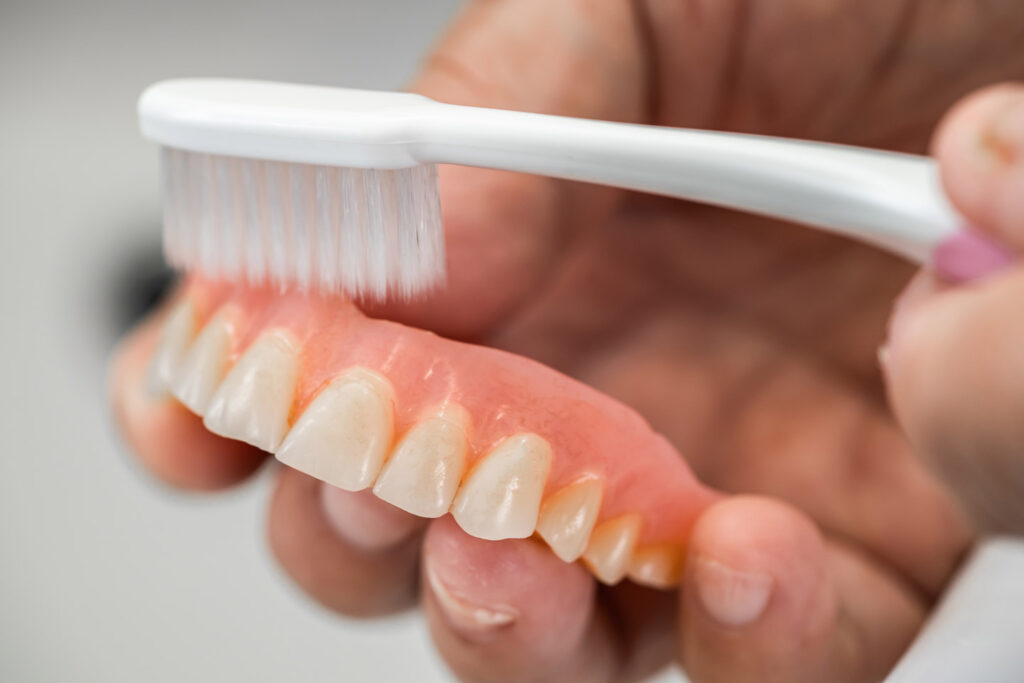
Tartar buildup on dentures can be both unsightly and uncomfortable, and it’s essential to maintain good oral hygiene to keep your dentures clean and functioning properly. While regular cleaning is necessary to prevent tartar accumulation, there are quick and effective methods to remove tartar from dentures instantly. Here’s a step-by-step guide on how to remove tartar from dentures quickly and effectively.
What is Tartar on Dentures?
Tartar, also known as calculus, is a hard, yellowish deposit that forms on dentures when plaque— a sticky film of bacteria— combines with minerals in saliva. If not cleaned regularly, plaque hardens into tartar and can lead to bad odors, stains, and even irritation to the gums. Removing tartar from dentures is important not only for cosmetic reasons but also to maintain oral health and comfort.
Soak Dentures in Denture Cleaner
One of the easiest ways to begin tartar removal is by soaking your dentures in a denture cleaning solution. These solutions are specifically formulated to dissolve plaque and tartar, making the cleaning process much easier.
- Step 1: Submerge your dentures in a cleaning solution or a mixture of warm water and denture-cleaning tablets.
- Step 2: Let them soak for at least 15 to 30 minutes. This will loosen any tartar and plaque buildup.
- Step 3: After soaking, use a soft-bristled toothbrush to scrub the dentures gently.
Scrub with a Soft Toothbrush
Once the tartar has been loosened by soaking, the next step is to scrub the dentures using a soft-bristled toothbrush. This helps remove any remaining tartar without damaging the surface of the dentures.
- Use a toothbrush with soft bristles designed for dentures or a regular toothbrush with soft bristles.
- Gently scrub the areas with visible tartar buildup. Pay special attention to the gum line and other places where tartar is most likely to form.
- Make sure to scrub in circular motions to avoid scratching the dentures.
Use Vinegar and Baking Soda
For tougher tartar buildup, you can use a natural mixture of white vinegar and baking soda. These two ingredients are known for their ability to break down tartar and plaque and are safe for use on dentures.
- Step 1: Mix equal parts of white vinegar and water in a small container.
- Step 2: Submerge your dentures in the mixture for about 10–15 minutes to soften the tartar.
- Step 3: After soaking, sprinkle a little baking soda on a damp toothbrush and gently scrub the dentures. Baking soda acts as a mild abrasive that helps lift stubborn tartar.
Rinse Thoroughly
After removing tartar from your dentures, it’s crucial to rinse them thoroughly under warm running water. This helps remove any cleaning solution or residue left from the vinegar and baking soda mixture.
- Step 1: Hold your dentures under warm running water to rinse off any remaining cleaner.
- Step 2: Ensure that no cleaning residue is left behind to avoid any unpleasant tastes or irritation when wearing the dentures.
Be Gentle and Avoid Harsh Scrubbing
While cleaning, always remember to use gentle methods. Harsh scrubbing or using abrasive materials can scratch or damage your dentures, affecting their fit and appearance.
- Tip: Stick to soft-bristled brushes and avoid using hard-bristled toothbrushes, which can cause unnecessary damage to the denture surface.
Why You Should Regularly Clean Your Dentures
Maintaining a routine cleaning schedule can prevent tartar buildup and prolong the lifespan of your dentures. Tartar can harbor bacteria, leading to gum irritation, bad breath, and other oral health problems. Here are a few tips to keep your dentures tartar-free:
- Brush dentures daily using a soft toothbrush and denture-safe cleaner.
- Soak dentures overnight in a cleaning solution to remove bacteria and prevent buildup.
- Rinse dentures after meals to remove food particles that can contribute to plaque buildup.
- Visit your dentist regularly for professional cleanings and checkups to keep your dentures in optimal condition.
Conclusion
Removing tartar from dentures doesn’t have to be difficult or time-consuming. By following these simple steps—soaking, scrubbing with a soft toothbrush, and using natural cleaning agents like vinegar and baking soda—you can keep your dentures tartar-free and looking great. Regular care and maintenance of your dentures will not only improve their appearance but also ensure your oral health remains at its best. If tartar buildup persists despite your efforts, be sure to consult your dentist for a professional cleaning.
